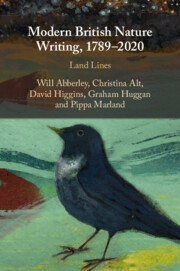Chapter 2 - Victorian
Published online by Cambridge University Press: 10 March 2022
Summary
Victorian nature writing vacillated between escapist pastoral idealism and hands-on georgic realism. Its narrators were at once labourers and idlers, scientists and aesthetes. The genre’s hybridity allowed it to mediate between mechanistic paradigms of nature and religious beliefs and experiences. Natural environments were constructed as realms of both Darwinian struggle and spiritual revelation. Imagining nature appreciation as a form of self-culture sometimes encouraged a nascent ecological and humanitarian sensibility. However, Victorian nature writing remained generally anthropocentric, centring the human mind. Yet, some authors, particularly later in the period, also framed wild environments and organisms as radically alien and unknowable. These different tendencies were often expressed through rhetoric of strangeness and estrangement, which dovetailed with ambivalences about identity, place and belonging. While authors classified objects, creatures and plants as alternately native or foreign, these categories frequently became blurred or uncertain. Authors also equivocated on where to locate ‘nature’, tracing it through rural, coastal and urban areas, in the great outdoors and human homes. Authors discussed include John Ruskin, Charles Kingsley, Philip Henry Gosse, Margaret Gatty, Hugh Miller, Eliza Brightwen, Richard Jefferies and W. H. Hudson.
- Type
- Chapter
- Information
- Modern British Nature Writing, 1789–2020Land Lines, pp. 84 - 130Publisher: Cambridge University PressPrint publication year: 2022



